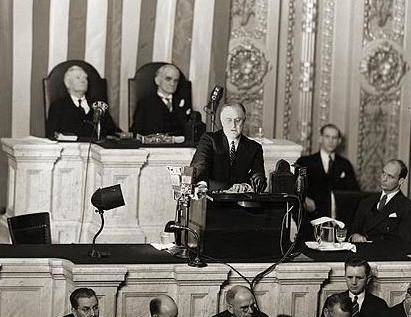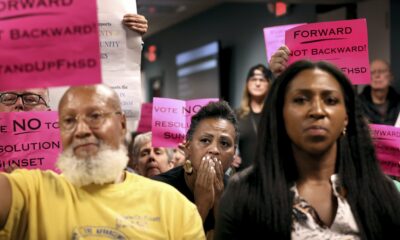Labor & Economy
Affordable Care Act: Freedom from Ignorance

The Supreme Court’s deliberation on the Affordable Care Act goes to the heart of differing visions of the American concept of “freedom” and “liberty.” It’s a debate worth having.
In court this week, Solicitor General Donald B. Verrilli Jr. described what real freedom looks like. “There will be millions of people with chronic conditions like diabetes and heart disease,” he said, “and as a result of the health care that they will get, they will be unshackled from the disabilities that those diseases put on them and have the opportunity to enjoy the blessings of liberty.”
Verrilli’s argument evokes FDR’s famous “Four Freedoms Speech” that included freedom from “want” and “fear.”
FDR repeatedly articulated and elaborated upon those ideals. On June 8, 1934, in a special message to Congress he said:
“[I]n the earlier days, the interdependence of members of families upon each other and of the families within a small community upon each other” [provided fulfillment and security.] “The complexities of great communities and of organized industry make less real these simple means of security. Therefore, we are compelled to employ the active interest of the nation as a whole through government in order to encourage a greater security for each individual who “composes it.
“I place the security of the men, women and children of the Nation first.” People had the “right” to “decent homes to live in,” “productive work,” and “security against the hazards and vicissitudes of life.”
Three weeks later in a Fireside chat, he continued:
“[Some] will try to give you new and strange names for what we are doing. Sometimes they will call it ‘Fascism,’ sometimes ‘Communism,’ sometimes ‘Regimentation,’ sometimes ‘Socialism.’ But, in so doing, they are trying to make very complex and theoretical something that is really very simple and very practical….Plausible self-seekers and theoretical die-hards will tell you of the loss of individual liberty. ”
Later that year in another Fireside chat he went further:
“The tremendous power of organization has combined great aggregations of capital in enormous industrial establishments.. . so great in the mass that each individual concerned in them is quite helpless by himself…. [T]he old reliance upon the free action of individual wills appears quite inadequate…[T]he intervention of that organized control we call government seems necessary.
“Men may differ as to the particular form of governmental activity with respect to industry or business but nearly all are agreed that private enterprise in times such as these cannot be left without assistance and without reasonable safeguards lest it destroy not only itself but also our process of civilization.
“The legitimate object of Government is to do for a community of people whatever they need done but cannot do at all or cannot do so well for themselves in their separate and individual capacities.
“I am not for a return to that definition of liberty under which for many years a free people were gradually regimented into the service of the privileged few. I prefer and I am sure you prefer that broader definition of liberty under which we are moving forward to greater freedom, to greater security for the average man than he has ever known in the history of America.”
The Tea Party is right; it’s about freedom and liberty. But living with suffering, chronic disease and disability are oppressive limits on our liberty. Real freedom and individual liberty is about knowing you’ll get health care when you need it, about avoiding bankruptcy when illness or accident strikes and about a healthy and secure life for each of us as individuals and for all of us as a nation of interconnected and interdependent people.
(Editor’s Note: This feature first appeared on Huffington Post.)
-

 California UncoveredApril 9, 2024
California UncoveredApril 9, 2024700,000 Undocumented Californians Recently Became Eligible for Medi-Cal. Many May Be Afraid to Sign Up.
-

 Feet to the FireApril 22, 2024
Feet to the FireApril 22, 2024Regional U.S. Banks Sharply Expand Lending to Oil and Gas Projects
-

 Class WarMarch 26, 2024
Class WarMarch 26, 2024‘They Don’t Want to Teach Black History’
-

 Latest NewsApril 10, 2024
Latest NewsApril 10, 2024The Transatlantic Battle to Stop Methane Gas Exports From South Texas
-

 Latest NewsApril 23, 2024
Latest NewsApril 23, 2024A Whole-Person Approach to Combating Homelessness
-

 Latest NewsMarch 27, 2024
Latest NewsMarch 27, 2024Street Artists Say Graffiti on Abandoned L.A. High-Rises Is Disruptive, Divisive Art
-

 State of InequalityApril 11, 2024
State of InequalityApril 11, 2024Dispelling the Stereotypes About California’s Low-Wage Workers
-

 Latest NewsApril 24, 2024
Latest NewsApril 24, 2024An Author Reflects on the Effort to Rebuild L.A. After the ‘Violent Spring’ of 1992




















